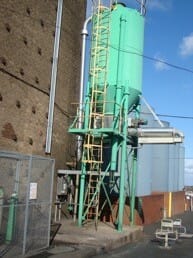Removing the spent grain each day from its production site is essential to keep Manor Vinegar’s brewing operation running smoothly. A daily co-product collection service from ForFarmers is not only helping the company to meet its challenging production schedule, it’s also bringing in additional revenue – and saved Manor Vinegar from a three-week halt in production when a serious incident occurred.
ForFarmers collects, blends and trades over half a million tonnes of co-products each year from UK food and drink producers. Known for its punctual and professional service, as well as delivering increased revenue for its customers, it has been handling Manor Vinegar’s co-product needs for over 15 years.
Based in Burntwood, Staffordshire, Manor Vinegar is one of Europe’s largest vinegar producers. It has supplied malt, spirit, distilled, speciality, and red and white wine vinegar to retailers, wholesalers and food manufacturers for over 100 years. A by-product of its operation is spent brewers’ grain, which is stored on-site in a silo. It is essential for Manor Vinegar that the silo is emptied of co-products each day for the firm’s continuous operation to be maintained.
A flexible friend
“Our production volumes can vary, which alters collection times, so it’s essential that our co-product collection partner is flexible,” explains Seamus Clarke, Production Manager for Manor Vinegar. “If not, we would quickly reach our storage capacity and be forced to halt production.”
To ensure this doesn’t happen, the ForFarmers account managers, in conjunction with its hauliers, communicate closely with the in-house team at Manor; predicting, planning and reviewing collection times on a daily basis, including weekends and evenings, to ensure the drivers arrive at precisely the optimum moment. As a result, Manor Vinegar is able to meet its rigorous production schedule.
“ForFarmers realise how important flexible collections are and the impact of any delay, and work hard to ensure their drivers arrive at the right time for us each day,” adds Seamus.
“It’s a balancing act,” says Paula Parker, Bulk Feeds Trading Manager at ForFarmers. “We understand that there’s a very small window between maximising the collection haulage costs for Manor Vinegar (i.e. making sure the tipper trailer is as full as possible) and ensuring they have the space they need to store the spent grain from their next brew. We know how crucial this is – if we get it wrong then quite simply, their production stops.”
Good rates of return
Not only does this service enable smooth production at Manor Vinegar’s site, but the co-products also bring in an additional revenue stream. ForFarmers’ experienced commodity broking team strives to achieve the greatest return for Manor Vinegar by selling this valuable resource to farmers as animal feed. In fact, ForFarmers is responsible for feeding one in every four UK dairy cows, even creating new and bespoke animal feed blends through its in-house nutrition innovation centre to further increase co-product values for its customers. “While keeping production running smoothly is our primary concern, knowing that we’re getting a good rate of return for our co-products – and that they’re helping the food chain by being sent to farms – is a bonus,” states Seamus.
Dealing with disaster
However, ForFarmers really proved their worth as a partner early in 2019, when a major incident occurred at Manor Vinegar’s site. “A high-sided vehicle collided with the silo storing the spent grain and destroyed the discharge mechanism. It caused the grain to spill onto the floor and left us with a mash tun of fresh co-product,” begins Seamus. “We had a full order book but with nowhere to store the grain from each brew, we were forced to halt production. Initial enquiries into repairing or replacing the silo saw us looking at a downtime of at least three weeks – disastrous for our business.”
Hoping to find a speedier solution, Seamus called ForFarmers for advice. The situation was quickly taken in hand by Paula, who arrived on site within hours. “Spent grain is extremely hot so to avoid any health & safety issues, I made its safe removal from the site my first priority. However, it was now contaminated and in breach of FEMAS regulations, meaning it could not be sent to farms as animal feed. I therefore arranged for it to be removed within 24 hours and disposed of via land spreading.”
ForFarmers’ fast thinking
With one problem solved, Paula then turned her attention to finding a temporary silo replacement to enable production to restart. “Having visited many food and drink production sites, I was aware that another of our customers pipes their co-products directly into a trailer from the mash tun, without the need for a silo. I worked with Seamus and his team to measure the site and determine whether there would be enough room to accommodate an articulated lorry and associated pipework to do the same thing in this case, and we agreed there would be – just.”
Following ForFarmers’ specifications, Paula’s team hired a trailer while Seamus arranged for the necessary engineering work to take place overnight, so that the first direct-piping test could be carried out the following morning. Taking care that the pipe delivered into the middle of the trailer for balance, to ensure it didn’t tip, the cautious team began with just 15 tonnes, gradually ramping up the tonnage over the course of a few hours.
Restarting production
The solution proved such a success that Manor Vinegar was able to resume production just 30 hours after the silo was first damaged.
“At a really difficult time for our business, ForFarmers’ staff were full of ideas and knowledge, demonstrating their considerable experience within the food and drink industry,” says Seamus. “Not only did they help us to safely dispose of the spilt product, they also ensured we stayed compliant with the relevant regulations, and enabled us to restart production within just 30 hours. They really came to our rescue.”
Along with Manor Vinegar, ForFarmers works with a wide range of food and drink producers across the length and breadth of the UK, collecting, trading and blending their co-products into premium animal feed for British farmers, providing the optimal closed-loop sustainable food chain solution.








